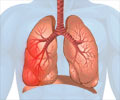Pleural Effusion - References
Cecil Medicine, 23rd Ed.- Harrison''s PRINCIPLES OF INTERNAL MEDICINE, 17TH Edition
- Macleod’s Clinical Examination, 12th Ed.
Pleural Effusion - About
Pleural effusion is the accumulation of fluid in the space between the two coverings (pleura) of the lung. The ability of the lung to expand is affected.
The two layers of the pleura are separated by a virtual cavity. About 5 to 10 ml of fluid is normally present in this cavity. This allows for lung expansion, and helps maintain lung inflation. When the fluid collection exceeds the safe level, the condition is called pleural effusion. The ability of the lung to expand is affected. Pleural effusions are more common in adults when compared to children.
Causes of Pleural Effusion
Pleural Effusion is usually a complication of an underlying illness. Based on the composition of the fluid and the underlying cause, pleural effusion can be:
- Transudate pleural effusions;
- Exudate pleural effusions.

This classification is not absolute, but it aids in evaluation and possible diagnosis.
Conditions leading to imbalances in hydrostatic and oncotic pressure result in transudate pleural effusion. These include:
- Congestive heart failure
- Liver failure; Cirrhosis
- Kidney failure; nephrotic syndrome
- Peritoneal dialysis
- Low albumin levels
- Hypothyroidism
- Pulmonary embolism
- Mitral stenosis
In transudate pleural effusion, fluid leaks from blood vessels into the pleural space.
Exudate pleural effusions are caused by inflammation of the pleura. The pathology often traces back to the lungs. Causes include:
- Malignancy (Lung cancer, Breast cancer, Lymphoma, Asbestosis Mesothelioma)
- Pneumonia
- Tuberculosis
- Auto immune disease (Systemic Lupus Erythematosus)
- Kidney failure; Uremia
- Meigs’ syndrome
- Pancreatitis
- Ascites
- Rheumatoid arthritis
- Pulmonary embolism
A number of drugs like amiodarone, nitrofurantoin, phenytoin, pergolide, methotrexate, penicillamine and bromocriptine cause exudative pleural effusion rarely.
Transudate pleural effusions contain less protein and LDH (lactate dehydrogenase) than exudate pleural effusions. Light’s criteria (described later) can be used to diagnose an exudate effusion.








